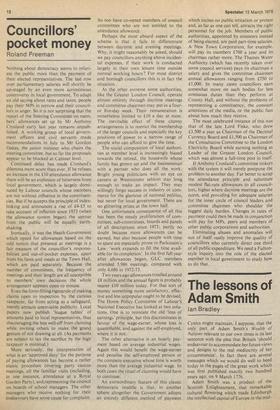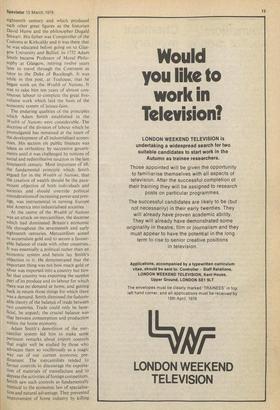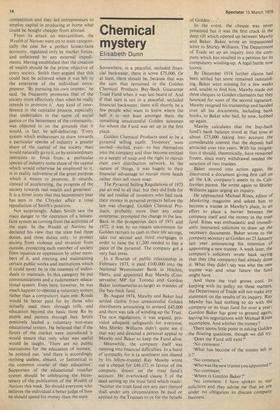The lessons of Adam Smith
Ian Bradley
Cynics might maintain, I suppose, that the only part of Adam Smith's Wealth of Nations relevant to our own times is its last sentence with the plea that Britain 'should endeavour to accommodate her future views and designs to the real mediocrity of her circumstances'. In fact there are several messages which we would do well to heed today in the pages of the great work which was first published exactly two hundred years ago, on 9 March 1776. Adam Smith was a product of the Scottish Enlightenment, that remarkable cultural flowering which made Edinburgh the intellectual capital of Europe in the mid eighteenth century and which produced such other great figures as the historian David Hume and the philosopher Dugald Stewart. His father was Comptroller of the Customs at Kirkcaldy and it was there that he was educated before going on to Glasgow University and Balliol. In 1752 Adam Smith became Professor of Moral Philosophy at Glasgow, retiring twelve years later to travel through the Continent as tutor to the Duke of Buccleugh. It was While in this post, at Toulouse, that he began work on the Wealth of Nations. It was to take him ten years of almost cone tinuous labour to complete the great fivevolume work which laid the basis of the economic system of laissez-faire.
The enduring qualities of the principles Which Adam Smith established in the Wealth of Nations were considerable. The doctrine of the division of labour which he Promulgated has remained at the heart of the development of all industrialised economies. His section on public finances was taken as orthodoxy by successive governments until it was challenged by notions of social and redistributive taxation in the late nineteenth century. Most important of all, the fundamental principle which Smith argued for in the Wealth of Nations, that the creation of wealth should be the paramount objective of both individuals and societies and should override political eonsiderationsof increasing power and prestige, was instrumental in turning Europe and America into industrialised societies.
At the centre of the Wealth of Nations was an attack on mercantilism, the doctrine Which had dominated Britain's economic life throughout the seventeenth and early eighteenth centuries. Mercantilism aimed to accumulate gold and to secure a favourable balance of trade with other countries. It was essentially a political rather than an economic system and herein lay Smith's Objection to it. He demonstrated that the important thing was not how much gold or Silver was imported into a country but how far that country was exporting the surplus Part of its produce and its labour for which there was no demand at home, and getting back in return those things for which there was a demand. Smith dismissed the fashionable theory of the balance of trade between two countries. Trade could only be beneficial, he argued; the crucial balance was that between consumption and production Within the home economy.
Adam Smith's demolition of the mercantilist system led him to make some Pertinent remarks about import controls that might well be studied by those who advocate them so vociferously as a magic Way out of our current economic predicament. The mercantilists tended to favour controls to discourage the exportation of materials of manufacture and to depress the activities of foreign competitors. Smith saw such controls as fundamentally inimical to the economic law of specialisation and natural advantage. They prevented iMprovement of home industry by killing competition and they led entrepreneurs to employ capital in producing at home what could be bought cheaper from abroad.
From its attack on mercantilism, the Wealth of Nations went on to state categorically the case for a perfect laissez-faire economy, regulated only by market forces, and unfettered by any external impediments. Having established that the creation of wealth should be the prime objective of every society, Smith then argued that this could best be achieved when it was left to the enterprise of the individual entrepreneur. By pursuing his own interest,' he said, 'he frequently promotes that of the society more effectively than when he really intends to promote it'. Any kind of interference in the capitalist process, especially that undertaken in the name of social justice or the betterment of the community, was objected to on the grounds that it would, in fact, be self-defeating: `Every system which endeavours to draw towards a particular species of industry a greater share of the capital of the society than would naturally go to it, or by extraordinary restraints to force from a particular species of industry some share of the capital which would otherwise be employed in it, is in reality subversive of the great purpose which it means to promote. It retards, instead of accelerating, the progress of the society towards real wealth and greatness'. It is a bitter irony that this bicentenary year has seen in the Chrysler affair a total repudiation of Smith's position.
Not surprisingly, Adam Smith saw the main danger to the operation of a laissezfaire system as coming from the activities of the state. In the Wealth of Nations he declared his view that the state had three duties, and three duties only: to protect society from violence and invasion from outside, protecting each member of society from injustice or oppression by other members of it, and erecting and maintaining certain public works and institutions which it could never be in the interests of individuals to maintain. In this category he put communications and a rudimentary educational system. Even here, however, he was much happier to operate a voluntary system rather than a compulsory state one. Roads would be better paid for by those who actually used them through tolls, and education beyond the basic three Rs by pupils and parents through fees. Smith positively lauded a voluntary non-state educational system. He believed that if the forces of the market were introduced it would ensure that only what was useful would be taught. 'There are no public institutions for the education of women,' he pointed out, 'and there is accordingly nothing useless, absurd, or fantastical in the common course of their education'. Supporters of the educational voucher system should be celebrating the bicentenary of the publication of the Wealth of Nations this week. So should everyone who believes the individual a better judge of how he should spend his money than the state.




































 Previous page
Previous page